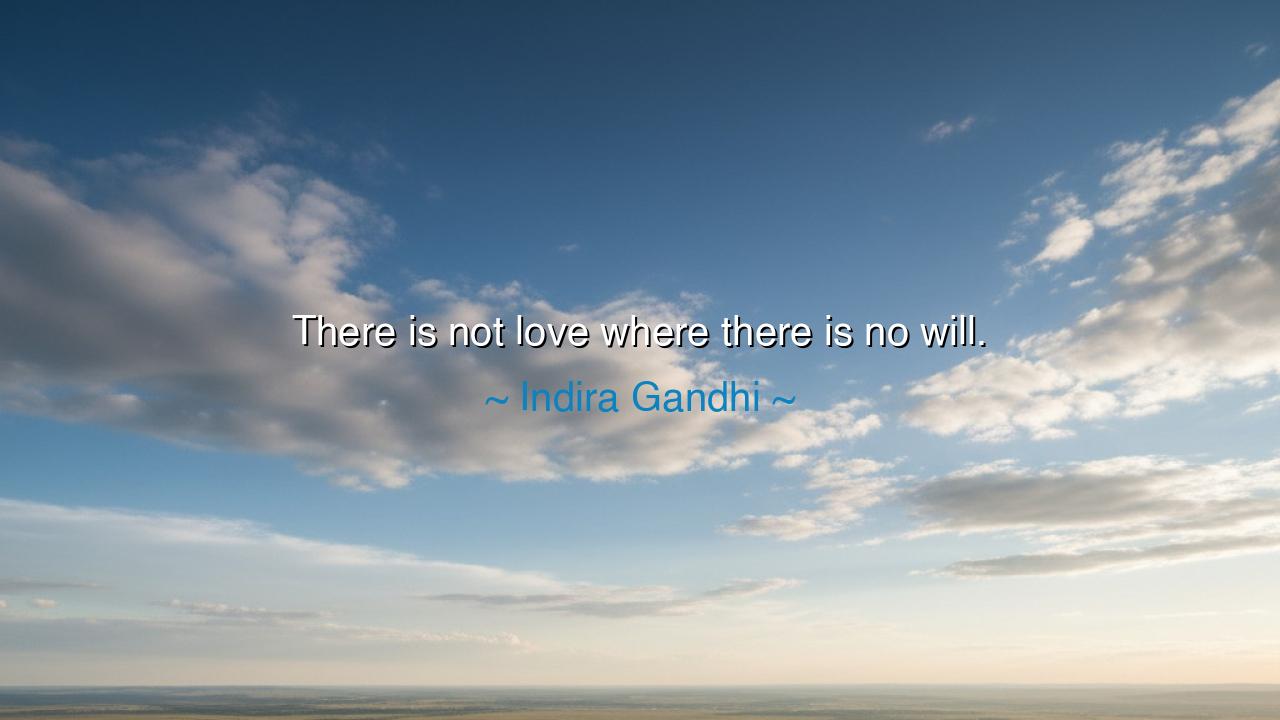
There is not love where there is no will.






The words of Indira Gandhi cut to the very marrow of human connection: “There is not love where there is no will.” At first, the phrase may seem simple, almost austere, yet within it lies the essence of devotion and endurance. For love is not merely a feeling that drifts upon the heart like a passing breeze; it is a choice, a commitment, an act of strength. Without the will to nurture it, protect it, and carry it through hardship, love cannot endure.
Throughout the ages, men and women have confused passion with permanence. They believe that love alone, unguarded and untested, will sustain them. But Gandhi’s words remind us that love without will is like a flame without fuel—it burns brightly for a moment, then fades into darkness. True love demands resolve, the courage to remain steadfast when trials come, the determination to keep giving even when the heart is weary.
History gives us vivid mirrors of this truth. Consider the story of Emperor Shah Jahan and Mumtaz Mahal, whose bond gave rise to the Taj Mahal. Their love was profound, but it was his will—the determination to honor her even after death—that transformed private affection into a monument eternal. Without will, their love would have perished with her passing. With will, it was immortalized in stone, to inspire generations. Thus Gandhi’s wisdom is proven: the endurance of love rests not only in the heart, but in the strength of will that sustains it.
Indira Gandhi herself, as leader of India, understood the burden of this truth in a broader sense. She knew that the love of one’s people, of one’s nation, is hollow if it is not fortified by the will to serve them. Sentiment alone does not feed the hungry, heal the sick, or defend the weak. Love for country, like love for another, must be sharpened by resolve, tested in sacrifice, and proven in action. Without will, love remains a whisper; with will, it becomes a roar that changes the world.
The ancients taught much the same. In the Greek tales, Penelope’s love for Odysseus endured twenty long years of absence, not by passion alone, but by her will to remain faithful, weaving and unweaving her web to hold off suitors. Her love was not a feeling of the moment, but a discipline of years. It was will that made her love unbreakable. So too in every relationship, whether of lovers, friends, or nations, it is the will to remain, to endure, to persist, that proves love’s strength.
The lesson, O seeker, is clear: if you would love, love not only with your heart, but with your will. Do not let your affection be shallow or fleeting. Choose daily to nurture it, to protect it, to work for it. Know that love will be tested by hardship, disappointment, and time, and when that testing comes, it is not passion that will save it, but willpower—the resolve to stay true.
Practical wisdom flows from this teaching: in your own life, ask yourself—do you show your love through choice and action, or do you expect it to endure without effort? Do you put forth the will to listen, to forgive, to sacrifice, to build? Practice these daily, and your love will not be fragile. Instead, it will be like a fortress, standing strong against the storms of life.
So let Gandhi’s words echo across the ages: “There is not love where there is no will.” For love is not only the fire that burns within the heart—it is also the strength of the hand that shields it, the discipline of the mind that guards it, and the resolve of the soul that carries it forward. Love without will fades; love with will becomes eternal.






LTDung Le Trong
This quote reminds me that love isn’t a passive feeling—it’s an active choice. But I wonder, is there a point where love becomes more about duty than desire? How do we differentiate between genuine love driven by will and love that’s simply maintained by habit or obligation? Can the will to love be strong enough to overcome difficult times, or is it always a balance between heart and will?
TGNguyen Thi Giang
The idea that love requires will makes me think about how relationships are built. It’s not enough to simply feel love; there has to be a will to make the relationship work. But is it possible to love without a conscious effort? I think about how we sometimes take love for granted. If love requires will, then what happens when we don’t put in that effort anymore?
TTLuong Tu Thanh
This quote is powerful, but it also makes me question whether the will to love is always present in relationships. What happens when love feels forced or when one person’s will isn’t as strong as the other’s? Does love become unhealthy when it’s maintained by sheer will? It feels like love should be a balance of both desire and intentionality, not just one or the other.
YPdao yen phuong
I agree with this quote, especially in the context of relationships. Love without will sounds empty, as if it’s not backed by the effort needed to sustain it. But what happens when the will fades? Does that mean love disappears? How do we keep that will strong? I wonder how much of a relationship's success depends on the intentional actions both partners take to keep the love alive.
TNTuyet Nhung
Indira Gandhi's statement seems to imply that love is more than just emotional—it’s about the will to make it work. But does this mean that if we don't act on our feelings, the love isn't real? It raises questions about how much responsibility we bear in our relationships. Can we love someone without actively trying to show it, or is willpower what keeps love alive in difficult times?